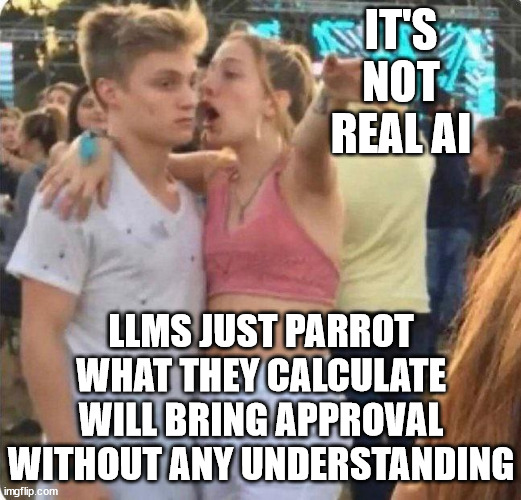this post was submitted on 05 Feb 2024
666 points (87.8% liked)
Memes
50993 readers
818 users here now
Rules:
- Be civil and nice.
- Try not to excessively repost, as a rule of thumb, wait at least 2 months to do it if you have to.
founded 6 years ago
MODERATORS
you are viewing a single comment's thread
view the rest of the comments
view the rest of the comments

Very true and valid. Tho, devils advocate for a moment, AI is great at discovering new ways to survive surgery and other cool stuff. Of course it uses the existing scientific discoveries to do that, but still. It could be the tool to find the next biggest thing on the penicillin, anaesthesia, haber process, transistor, microscope, steel list which is pretty cool.
Is it? This seems like a big citation needed moment.
Have LLMs been used to make big strides? I know some trials are going on aiding doctors in diagnosis and stuff but computer vision algorithms have been doing that for ages (shit contrast dyes, pcr, and blood analysis also do that really) but they come with their own risks and we haven't seen like widespread unknown illnesses being discovered or anything. Is the tech actually doing anything useful atm or is it all still hype?
We've had algorithms help find new drugs and stuff, or plot out synthetic routes for novel compounds; We can run DFT simulations to help determine if we should try make a material. These things have been helpful but not revolutionary, I'm not sure why LLMs would be? I actually worry they'll hamper scientific progress by aiding fraud (unreproducible results are already a fucking massive problem) or extremely convincingly lying or omitting something if trying to use one to help in a literature review.
Why do you think LLMs will revolutionise science?
He said AI, not LLMs specifically.
This seems like splitting hairs agi doesn't exist so that can't be what they mean. AI applies to everything from pathing algorithms for library robots to computer vision and none of those seem to apply.
The context of this post is LLMs and their applications
The comment you replied to first said "AI", not "LLMs". And he even told you himself that he didn't mean LLMs.
I'm not saying he's right, though, because afaik AI hasn't made any noteworthy progress made in medical science. (Although a quick skim through Google suggests there has been). I'm just saying that's clearly not what he said.
I thought they was saying they didn't mean llms will aid science not that llms wasn't the topic. Ambiguous in reread.
AI isn't well defined which is what I was highlighting with mentions of computer vision etc, that falls into AI and it isn't really meaningfully different from other diagnostic tools. If people mean agi then they should say that, but it hasn't even been established it's likely possible let alone that we're close.
There are already many other intelligences on the planet and not many are very useful outside of niches. Even if we make a general intelligence it's entirely possible we won't be able to surpass fish level let alone human for example. and even then it's not clear that intelligence is the primary barrier in anything, which was what I was trying to point out in my science held back post.
There are so many ifs AGI is a Venus is cloudy -> dinosaurs discussion, you can project anything you like on it but it's all just fantasy.
Idk it probably won't. That wasn't exactly what I was saying, but I'm also not an expert in any scientific field so that's my bad for unintentionally contributing to the hype by implying AI is more capable than it currently is or has the potential to be
Fair enough, I used to be scientist (a very bad one that never amounted to anything) and my perspective has been that the major barriers to progress are: